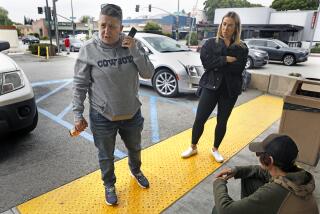SISTER MOM
- Share via
Almost five years ago, Amy Waldroop came as close as she ever has to realizing her dream of having a carefree, normal life.
She was about to graduate from Villa Park High School and had been offered a scholarship to UCLA, thanks to her stellar performance in the classroom and on the track team.
Then Waldroop was called into the school administrator’s office. She was told social workers were planning to remove her younger siblings from their grandmother’s house and put them in foster care.
Waldroop found herself flooded with memories of her chaotic childhood--a world of living out of cars and motels, of being shuttled from foster family to foster family or, when nobody wanted the children, to a juvenile detention center.
It was a world that revolved around her mother, who lost her battle against drugs again and again, stumbling in and out of prison, in and out of their lives.
Waldroop had dreamed of escaping that world many times.
But on that day in 1993, toward the end of her senior year, Waldroop made a decision: She would take care of her three younger brothers and sister herself.
“There was no way I was going to let them grow up that way,” she said.
Two days after her high school graduation she became her siblings’ legal guardian. For her brothers and sister, there would be no more living with strangers in strange homes.
For her, there would be no college scholarship, no heading off to UCLA.
“I gave up the scholarship that day and got the kids that night,” Waldroop said.
Many people told Waldroop she was wasting her talents, spoiling her chances for a promising future. She didn’t listen.
“People ask me, ‘What are you doing with your life?’ I look at it as I’m saving other lives,” she said. “I’m all they know.”
When Waldroop was 12, she went to live with her grandmother. She was later joined by her younger brothers. That arrangement lasted until a social worker discovered that her mother was making unsupervised visits to the home.
A judge granted Waldroop emancipation from the foster care system when she was 17 1/2, and a high school counselor proposed that Waldroop petition juvenile court to become the boys’ legal guardian.
*
Waldroop had already proven responsible beyond her years. She’d started working at age 12, sweeping floors at a beauty salon for $2 an hour. In high school she often held two part-time jobs, working at a Coco’s restaurant and Conroy’s Flowers and as a nurse’s assistant at UCI Medical Center.
She saved $10,000, money she hoped would buy her freedom. Instead it went for furniture, clothes, the down payment on a car, and everything else she needed to start a home.
At 23, Waldroop is single-handedly raising her three brothers--Adam, 13, Joey, 11, and Tony, 8--as well as her own 3-year-old son Donavin.
For a short time she also cared for a sister, now 18, who went to live with an aunt.
She had a fiance, but he was overwhelmed at the prospect of raising a group of boys and left two weeks after she gave birth to Donavin.
“My brothers think of me as mom, although they call me Amy. So does Donavin, but he’s learning to call me Mom,” Waldroop said.
Two of her brothers show signs of developmental disability, the result of being born with drugs in their systems. Waldroop cares for all of them in a rented three-bedroom townhome in Anaheim while holding down a full-time job.
“At first I was really scared, but they’re really good kids,” she said. “Now they’re like my own.”
Waldroop has given the boys something she never had: A stable home, one with beds and toys and family photographs on the walls.
Her achievement in the face of enormous obstacles has not gone unnoticed. She recently received PacifiCare’s Touch a Life Award, the highest honor given to a former foster child by the Southern Area Fostercare Effort (SAFE), an Orange-based nonprofit agency that recruits foster parents for eight counties.
Antoinette Bailey, senior social worker with Orange County Children and Family Services in Orange, nominated Waldroop for the award because of “her willingness to put aside her own desires to care for her siblings and how hard she works to make ends meet and have as normal a life as possible.”
While it’s not uncommon for another family member to step in and take care of foster children, usually the guardian is an older relative.
“To have a sibling become a guardian is a rarity,” Bailey said.
Bailey handles cases where at least one child in the family was exposed to drugs while in the womb. She’s the social worker for Waldroop’s three brothers and has seen them thrive under Waldroop’s care.
“They’re really longing for some structure,” she says.
In June, when Waldroop went to the Ritz-Carlton Huntington Hotel in Pasadena to receive her award from SAFE, no one recognized the young woman because she was busy setting up the luncheon. That’s not the usual role of an honoree, but she felt awkward just standing around.
“She told me, ‘I can’t help it. I can’t sit still,’ ” said Barbara Labitzke, executive director of SAFE.
When she walked to the podium to accept her award and a $1,000 prize, the audience gave her an unprecedented standing ovation.
Most of the money went to buy beds and clothes for the boys, but Waldroop did splurge on one item for herself. The working mother who can’t sit still bought a rocking chair for her bedroom. It’s one of the few places she can go for a few minutes’ rest.
For Waldroop, making a home for four boys takes up every hour. She’s often exhausted from the strain of caring for her brothers, trying to make special time for her son and working 40 hours a week.
“I just feel old,” she said. “I was only a child when I got them, and this is a full-time job in itself.”
She’s busy from the time she gets up in the morning to feed the kids until the time they go to bed, when she catches up on laundry.
Just shuttling the boys to their schools requires military-style timing. Waldroop has to make sure everybody’s ready to go at 6:50 a.m. so that she can be at work by 8 a.m. She drops her son off at his preschool in Orange, takes her brother Tony to an elementary school in Anaheim and leaves the two oldest boys at a junior high in Placentia.
She spends the day working as a receptionist for a title company in Orange. After work, she picks up the boys and heads home to make dinner.
“Every night it’s homework, laundry, baths. Then it’s lights out. I’m zonked.”
On a recent weeknight, Waldroop was in the kitchen baking chicken and making a salad for the boys while chatting with her boyfriend, Matthew Maas. Maas works as an assistant sales representative for the same title company Waldroop does.
“The people in his family always hug and kiss,” Waldroop said. “The first time one of them went to hug me, I was like, ‘What are you doing?’ I had to get used to that.”
*
Waldroop’s mother is scheduled to be released from prison Wednesday, but Waldroop will retain custody. She receives $1,500 a month from the county for being a foster parent to the three boys.
After spending $1,050 for rent, $600 a month for day care and Boys and Girls Club fees, and buying gas, food, clothes and medicine, she’s often “broken,” as Donavin calls it.
“Just to provide the living space for three boys, not to mention food and other needs, far outweighs what we can ever pay her,” Bailey said.
Before school started, Waldroop struggled to pay for school supplies, clothes and book bags for all the boys.
“Everything you do, you have to do four times,” she said.
Waldroop’s dream is to one day own a house with a yard for the boys. She’s already applied to Habitat for Humanity, the agency that provides housing to low-income families who help build the homes themselves.
“I’d build the whole thing myself,” Waldroop said. “But there’s a big ol’ waiting list.”
For Waldroop, giving up her freedom to care for her brothers has led to a few rewards: from the Touch a Life prize and letters of recognition from Gov. Pete Wilson and First Lady Hillary Rodham Clinton. Yet the piece of paper she treasures more than those official proclamations is a Mother’s Day card. The card is signed by all the boys, and it reads:
“Thank you, Amy, for being the mother that we don’t have.”
More to Read
Sign up for Essential California
The most important California stories and recommendations in your inbox every morning.
You may occasionally receive promotional content from the Los Angeles Times.













